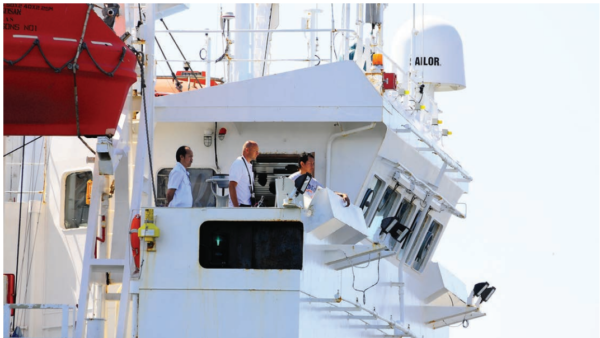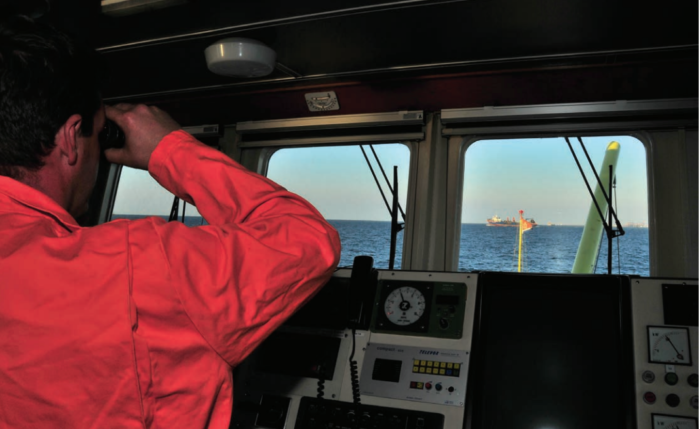Free Article : STCW for the future
The ongoing comprehensive review of the STCW Convention and Code is an opportunity to shape training and crewing requirements for decades to come – and NI members are invited to take part
Dr Malek Pourzanjani FNI
The IMO has initiated a ‘comprehensive review’ of the existing STCW Convention and Code. This is part of its commitment to have all of its regulatory instruments including the conventions, codes, training programmes, and circulars current, relevant, fit for purpose, and up to date. For this reason, there are regular amendments to the instruments, and major revisions as and when deemed necessary. As an NGO with consultative status at the IMO the NI is seeking to engage our members in order to participate in this essential work. This article sets out the history of the STCW and proposes some objectives for the NI. Shipping is recognised as a global industry with a high level of mobility in its workforce, and therefore requires a global regime to govern the competence standards and certification requirements for the approximately three million seafarers employed by the international merchant fleet. This is because most seafarers serve on ships with a flag state that is different from the country responsible for overseeing their training and issuing certificates of competence. This global regime is provided by the IMO’s STCW Convention which has now been in place for over 40 years.
Training of seafarers has traditionally been a matter of national pride, and has evolved and matured in different countries in different ways depending on national requirements and circumstances (see box, opposite). Until the mid-1970s, training and education of seafarers in different countries varied widely depending on the standards that had developed in those countries over the years. These variations included both the content and structure of the training and educational programmes. The emergence of the ‘open registry’ manning model drove a need for international harmonisation of standards, which eventually led to the development of the International Convention on the Standards of Training, Certification, and Watchkeeping for Seafarers (STCW) in 1978. Major revisions were undertaken in 1995 and 2010 (Manila amendments).
STCW 1978 – MK I
Until 1978 the standards of education and training, certification and watchkeeping for officers and ratings were decided by individual governments, without much reference to what was happening in other countries As a result, standards and procedures varied widely, even though shipping was and still is a truly global and international industry.
The STCW Convention was adopted by an International Conference on 7 July 1978 and entered into force on 28 April 1984.

The purpose of the STCW 1978 Convention was to establish basic requirements on training, certification and watchkeeping for seafarers at an international level. The Convention set minimum standards countries are obliged to meet or exceed. By December 2000, the STCW Convention had 135 states parties, representing 96% of world shipping tonnage.
The technical provisions of the 1978 Convention were contained in six chapters as an annex to the Convention.
- Chapter I, General provisions;
- Chapter II, Deck department;
- Chapter III, Engine department;
- Chapter IV, Radio department;
- Chapter V, special requirements for tankers; and
- Chapter VI, proficiency in survival craft. The 1991 amendments related to GMDSS. They were adopted by resolution MSC.21(59) and entered into force in December 1992.
- The 1994 amendments related to special training requirements for personnel working on tankers. They were adopted by resolution MSC.33(63) and entered into force in January 1996.
STCW 1995 – MK II
The first major revision of the Convention took place in 1995 in response to a recognised need to bring the Convention up to date and to respond to critics who pointed out the many vague phrases, such as ‘to the satisfaction of the Administration’, which resulted in different interpretations. Other complaints included that the Convention was never uniformly applied and did not impose any strict obligations on Parties regarding implementation.
A major aspect of the revised Convention was to change the content of the annex into regulations subdivided into eight chapters. This removed the issue where some countries took the annex as a set of compulsory instructions, where others took it as a set of recommendations which could be ignored. With the change to ‘regulations’, there was now no doubt that compliance with the annex was compulsory.
A new STCW Code was created, structured in eight chapters that mirror the chapters of the Convention. This Code sets the minimum standards of competence for seagoing staff, laid out in several tables. The Code is set out into two parts, Part A being mandatory, and Part B being a set of guidelines, recommendations and advisory in nature.
Another major change was that states parties to the Convention were required to provide detailed information to IMO on the administrative measures they had taken to ensure compliance, including independent evaluation of education and training courses, certification procedures and other factors. This was the first time that IMO had taken acted in relation to compliance and implementation – generally, implementation is left to the flag states, while Port State Control acts to ensure compliance.
The information is reviewed by panels of competent persons, nominated by parties to the STCW Convention, who report on their findings to the IMO Secretary-General. The Secretary-General in turn reports to the Maritime Safety Committee (MSC) on the states parties which fully comply. The MSC then produces a list of parties in compliance with the 1995 amendments. The first list of countries complying with this requirement was approved by the Maritime Safey Committee in December 2000.
The 1995 amendments entered into force on 1 February 1997. However, until 1 February 2002, states parties were able to issue, recognise and endorse certificates for seafarers who began training or seagoing service before 1 August 1998.
Following this first major revision, a number of amendments to the Convention were approved, including training for passenger vessel personnel in 1999 and amendments to the Code for cargo securing, loading and unloading bulk cargoes in 2003.

STCW 2010 – Manila Amendments – MK III
The next major update came 15 years after the first, with the adoption of the 2010 Manila amendments to the STCW Convention and Code. These amendments entered into force on 1 January 2012 under the tacit acceptance procedure – that is to say, acceptance is assumed, providing there is no objection. They were aimed at bringing the Convention and Code up to date with developments in the sector, and enabling them to address issues that are anticipated in the foreseeable future.
There are several important changes to each chapter of the Convention and Code, including:
- Measures to prevent fraudulent practices associated with certificates of competency
- Requirements on hours of work and rest
- New requirements for the prevention of drug and alcohol abuse
- Updated standards relating to medical fitness
- Certification requirements for ratings
- Requirements relating to training in modern technology such as ECDIS
- Requirements for marine environment awareness training and training in leadership and teamwork
- Training and certification requirements for Electro-Technical officers
- Updating of competence requirements for personnel serving on board all types of tankers, including new requirements for personnel serving on liquefied gas tankers
- Requirements for security training, as well as provisions to ensure that seafarers are properly trained to cope if their ship comes under attack by pirates
- Use of modern training methodology including distance and web-based learning
- Training guidance for personnel serving on board ships operating in polar waters
- Training guidance for personnel operating Dynamic Positioning Systems.
Proposal for a comprehensive revision of the STCW Convention – MK IV
Since 2016, some member states and NGOs have made submissions to the HTW sub-committee and the MSC requesting a full and comprehensive revision of the STCW convention. Following a submission led by Australia to MSC 105, the Committee agreed to launch a comprehensive review of the 1978 STCW Convention and Code, with a target completion of 2026. The HTW Sub-Committee was instructed to carry out a preliminary scoping of the work to be done, identifying specific areas to be covered and putting forward a road map to be considered by the Committee. Underlying reasons for the request included but were not limited to:
- A view that the 2010 revision was more of a tidying up exercise, and fell short of a comprehensive revision
- Major technological advances in information and communication technologies and digitalisation, with new equipment being introduced for shipboard operations
- Cyber security and cyber risk
- Current discussions on autonomy, levels of shipboard automation, and their impact on seafarers’ education and training
- GHG emissions, decarbonisation, alternative fuels and impact on education and training
- Advances in learning technologies such simulation and virtual reality
- Duration and quality of onboard training, including training of electro-technical personnel
- Quality standards at maritime education and training institutions
- The need to tackle sexual assault and sexual harassment (SASH).
A number of member states and organisations made submissions on the revision of the STCW Code to HTW 9 in 2023, which were considered by a working group. The Sub-Committee agreed to form a Correspondence Group (CG) to continue the conversation and seek views from member states and organisations. These will be reported back to HTW 10, which is scheduled for February 2024. The Nautical Institute is a member of the correspondence group – and is now actively seeking input from our members to guide our input.
The Nautical Institute’s engagement
There is an expectation by the shipping sector that The Nautical Institute as a professional body can and should contribute to the process of review.
Aim
We aim to draw on the experience and expertise of NI members in order to improve the STCW to the highest appropriate standard and identify areas of best practice that can add value to the maritime industry alongside the Convention and Code.
Objectives
1. Engage NI members and stakeholders in the review process to benefit from the group wisdom and to align our outputs with expectations
2. Justify benefits of seatime, including how seatime can be made more effective. Establish the appropriate use of simulation to augment seatime
3. Demonstrate leadership in the global use of simulation for training, familiarisation and assessment
4. Align the NI with other like-minded organisations in order to have greater impact
5. Focus on the assessment of competency (original and revalidation) as a key skill for the maritime industry both ashore and at sea 6. Identify new areas of competency to be included in STCW, such as IT and fuel handling
7. Identify areas that should be removed from the existing Convention and Code
8. Identify improvements for ship-handling training
9. Identify where ‘best practice’ guides are more effective than STCW regulations and what role the NI should have in producing them
10. Ensure that DP Certification remains a high (rather than minimum) standard
11. Consider how specialised skills such as tug handling and offshore energy operations should be recognised
12. Ensure that focus on Human Factors is maintained.
Have your say
The Nautical Institute has established a special interest group under the leadership of Dr Malek Pourzanjani FNI to oversee the NI’s input into this review. This group is expected to last for the duration of the review and to provide feedback on implementation issues over a period of perhaps five years. If you are interested in participating, please contact us at research@ nautinst.org with a brief description of your interest and background. You are also welcome to share specific thoughts on STCW revision with us at the same address. The NI will be holding a round table discussion on the benefits of seatime and simulation to maximise learning at NIHQ on Thursday 8 February 2024. Please RSVP [email protected]
